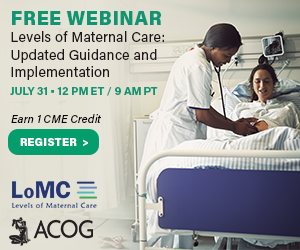
Seattle Cluster, Aug. 19–22
Register- Program Spotlight: Access Education Without the Travel
- Reconciling Internal, External Operational Aspects Affects Care Outcomes
- Multiple Resources Available to Prepare for Board of Governors Exam
- Postgraduate Fellowships: Creating Future Leaders
- Why Does Consumerism Feel Like a Foreign Language?
- CMS Updates Alternative Payment Model Tool
Program Spotlight:
Access Education Without the Travel
Discover ways to optimize employed physician networks and prevent diagnostic errors during these upcoming webinars, each worth 1.5 ACHE Qualified Education credits.
The Aug. 27 webinar, “Building Strategic Value With Your Employed Physician Network,” will examine practical strategies physician groups can pursue to benefit their patients and the health system.
The complimentary webinar, “Addressing Diagnostic Error: A Top Source of Preventable Harm and Cost,” will evaluate key approaches organizations can take to mitigate this critical issue. The Society to Improve Diagnosis in Medicine will co-host this webinar on Sept. 24.
Missed one of our live webinars? ACHE has webinar recordings available at your convenience. Earn 1.5 ACHE Qualified Education credit for each recording you view. Learn more about our e-learning offerings—including seminars and self-study courses—online.
Reconciling Internal, External Operational Aspects Affects Care Outcomes
Successful healthcare leaders are those who deal with both internal and external aspects of health system operations, according to Eric W. Ford, PhD, editor of the Journal of Healthcare Management. In the July/August 2019 issue, the articles in JHM focus on how reconciling the impact of both aspects on care outcomes is one of the largest challenges facing healthcare leaders.
In an interview, past ACHE Chairman Officer Christine M. Candio, FACHE, president/CEO, St. Luke’s Health Corporation, St. Louis, explains how committees at her organization, comprised of both internal and external stakeholders, are used to improve care. You can also listen to Candio in the latest JHM podcast, “A Leader Who Cares.”
For too long, many health systems have deemed zero errors as impossible or too costly. In his column, M. Michael Shabot, executive vice president/system chief clinical officer at Memorial Hermann Health System, Houston, recommends the high-reliability organization model to achieve the aim of zero errors.
In another column, Robert S. Chaloner, FACHE, chief administrative officer at Stony Brook Southampton (N.Y.) Hospital, emphasizes that meeting people on their own terms is vital for compassionate care.
This issue also includes the winning graduate and undergraduate essays of ACHE’s 2019 Richard J. Stull Student Essay Competition in Healthcare Management, along with original research articles about integrating social determinants of health information into the patient care process, and the use of simulation techniques to model different evidence-based health interventions.
Multiple Resources Available to Prepare for Board of Governors Exam
Passing the Board of Governors Examination is one step on the path to becoming board certified in healthcare management as a Fellow of ACHE. To help you prepare, consider attending the Board of Governors Examination Review Course, Sept. 23–25, in Atlanta. The course will provide you with a breadth of information across the 10 core knowledge areas on the Exam, along with testing strategies, sample questions and a better understanding of the Exam’s content, structure and scoring.
Take your preparedness for the Exam a step further when you register for the review course and purchase the ACHE Board of Governors Exam Flashcards together.
Additional Board of Governors Exam study resources include Board of Governors Online Tutorials, the Study Set and the Study Bundle. Also note that many local chapters organize their own study sessions.
Visit ache.org/FACHE and select “The Board of Governors Exam” from the menu on the left to learn more about all available Exam study resources.
Postgraduate Fellowships: Creating Future Leaders
Postgraduate fellowships contribute to the development of future leaders and provide tangible benefits to sponsoring organizations and the profession. The Directory of Postgraduate Administrative Fellowships gives sponsoring organizations the tools needed to develop a fellowship, including detailed resources on logistics, compensation and benefits, recruiting, onboarding and assessing candidates. Organizations that post opportunities in the directory increase their visibility for students seeking postgraduate administrative fellowships on a national level.
Whether you are an organization creating a fellowship, a student seeking a postgraduate administrative fellowship, or an organization ready to post or update a current listing, you'll find a variety of resources available at ache.org/PostGrad.
Why Does Consumerism Feel Like a Foreign Language?
Avoiding healthcare consumerism is no longer an option, according to patient experience expert Jake Poore. This blog post addresses the importance of healthcare executives and providers understanding consumers, reacting to their needs and learning to speak their language.
To accomplish this undertaking, healthcare leaders must integrate an understanding of the consumer-to-patient journey into their culture, according to ACHE faculty Jake Poore, president and chief experience officer, Integrated Loyalty Systems Inc., Orlando, Fla.
“By involving every team member, across all lines of the patient experience, and making them the architects responsible for developing a new organizational culture, they’ve not only created it, they own it,” says Poore. “This authorship and ownership leads to mutual accountability, which means your team will police it every day at all levels…even when you’re not around.”
Read the blog post to learn more about integrating consumerism into your organization’s culture.
CMS Updates Alternative Payment Model Tool
The Centers for Medicare & Medicaid Services recently updated its alternative payment model participation status tool for the 2019 Quality Payment Program.
With the passage of the Medicare Access and CHIP Reauthorization Act of 2015, the QPP program replaced the use of the Sustainable Growth Rate law to set clinician payment increases. Since the QPP took effect in 2017, clinician payments are available through one of two sources:
- Merit-based Incentive Payment System, where clinicians may earn performance-based payment adjustments for the services they provide to Medicare patients
- Advanced alternative payment models—a customized payment approach often designed to provide incentives to clinicians providing high-quality, high-value care.
The updated APM participation status tool identifies eligible clinicians who qualify as advanced APM participants based on Medicare Part B claims data through March for the 2019 performance period. Qualifying clinicians are exempt from participating in MIPS and eligible to receive the 5 percent APM incentive payment in 2021. Read this CMS fact sheet to learn more.


